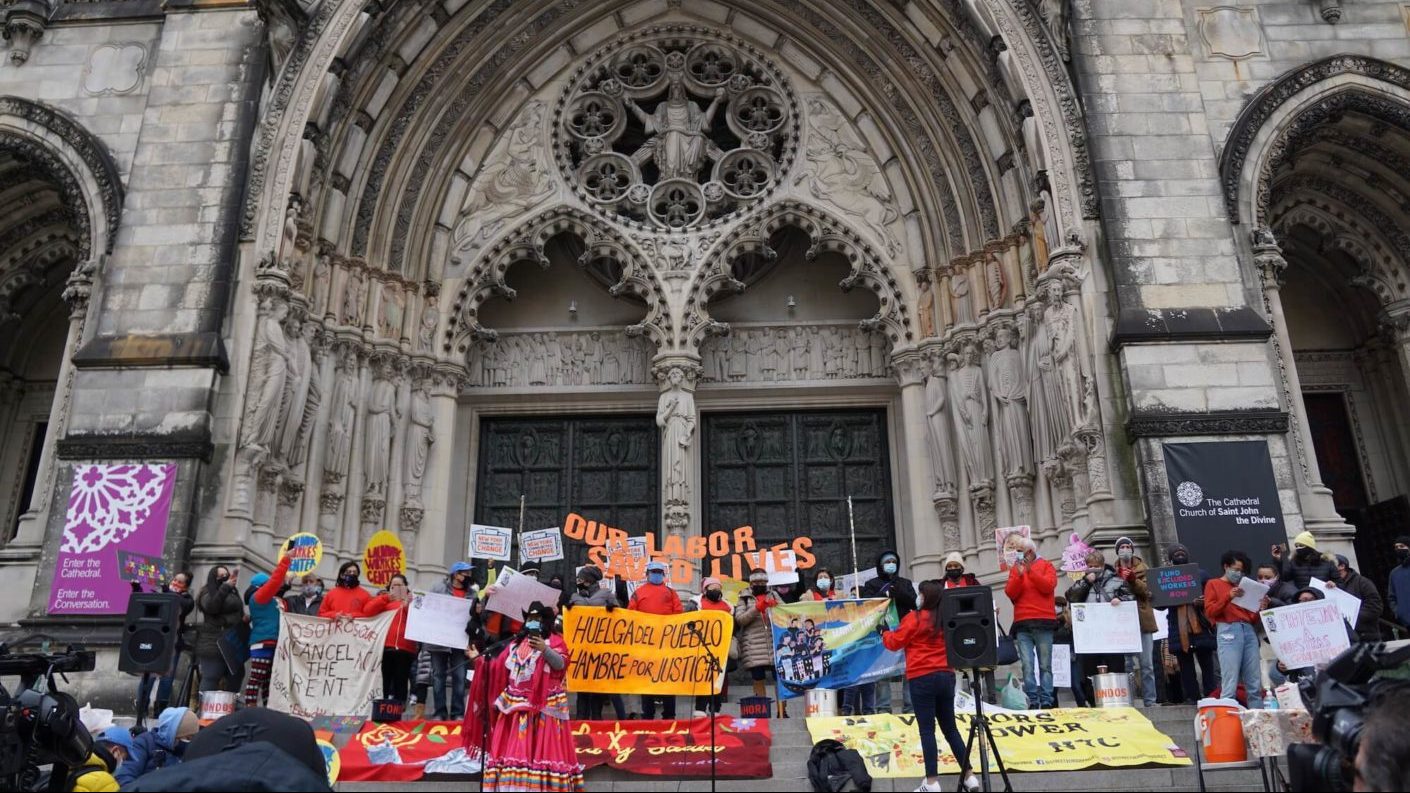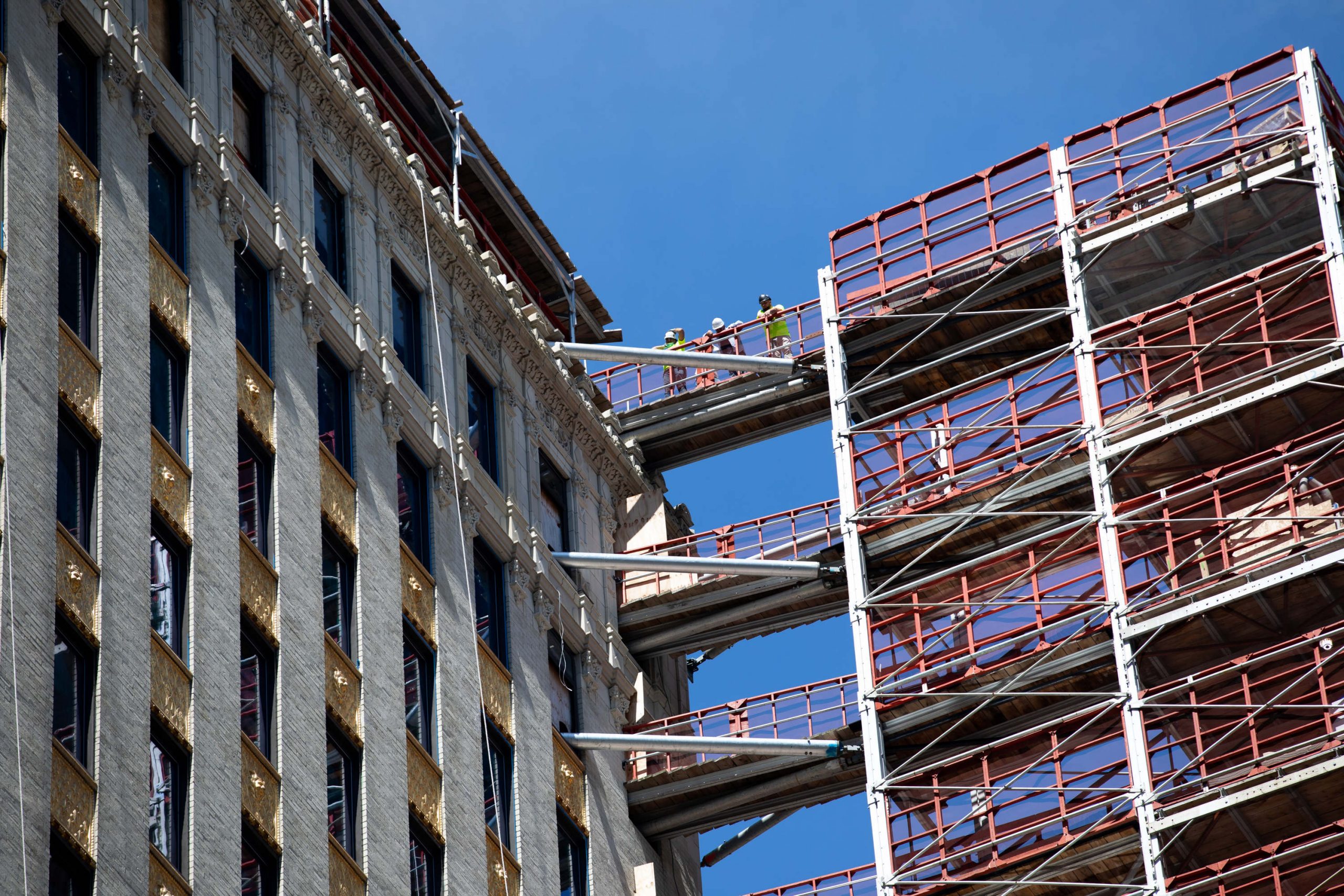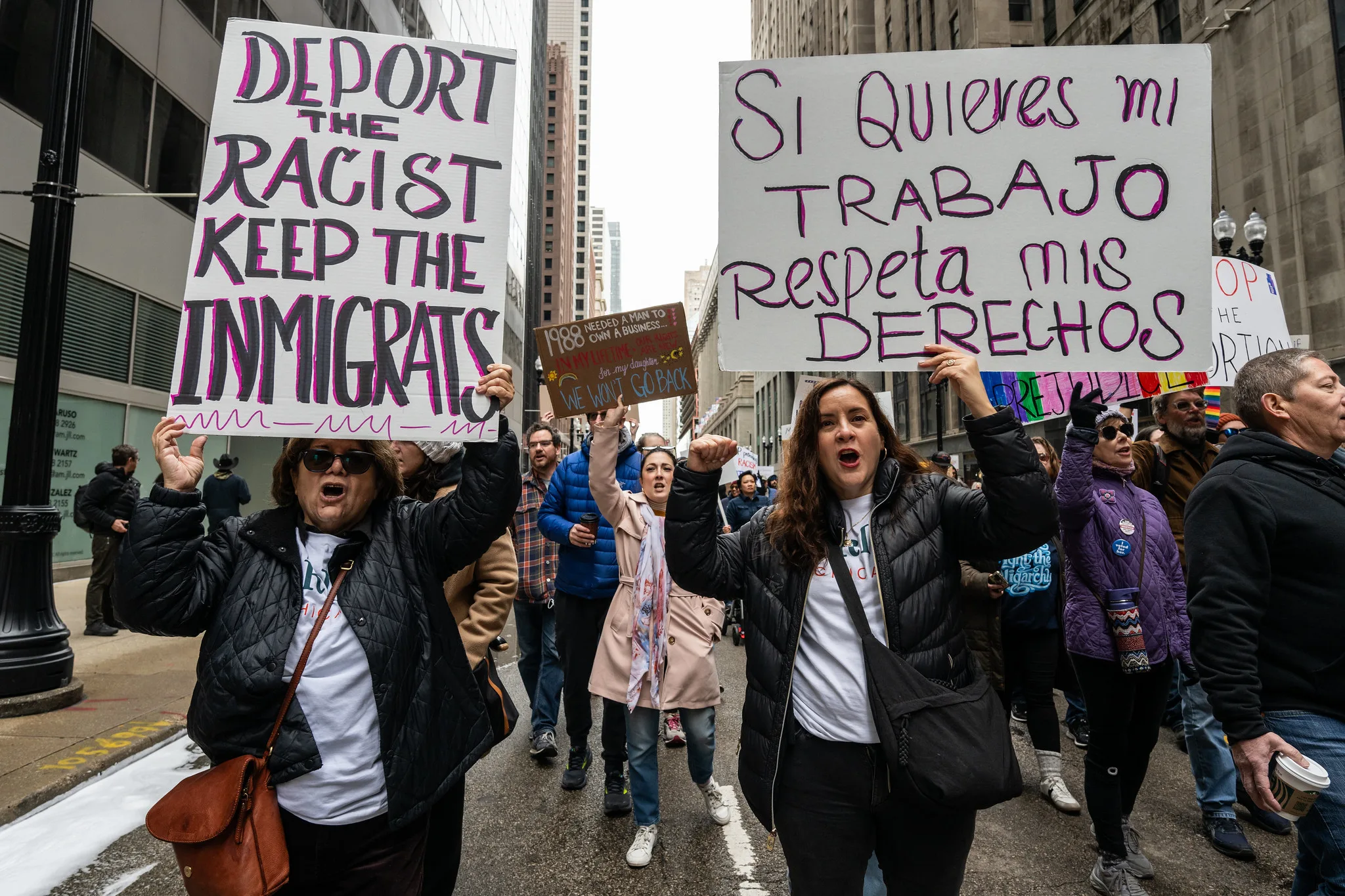This story originally ran in The Counter, a non-profit newsroom covering the forces shaping how and what we eat. Read more at thecounter.org.
Street vendors, restaurant workers, and other essential workers launched a hunger strike on Tuesday, calling on New York state legislators to provide more financial assistance to workers who have been left out of past Covid-19 relief packages due to immigration status.
Strikers are petitioning Albany lawmakers to earmark $3.5 billion in funding for undocumented workers. These workers are otherwise ineligible for unemployment benefits and stimulus checks included in previous relief bills, including last week’s $1.9 trillion Covid-19 rescue package. The hunger strike, which organizers named the “Fast for the Forgotten,” kicked off in Manhattan’s Morningside Heights neighborhood before heading downtown.
“We’re here today because they tell us that we’re essential, but they treat us like we’re not,” said one speaker during the event kickoff on the steps of the The Cathedral Church of St. John the Divine. Laid out before the protestors were empty pots, meant to symbolize the work they do in the food industry, as well as the food insecurity many have suffered due to lost income during the pandemic. “Here are domestic workers, street vendors, construction workers, delivery workers that travel in the snow to deliver food to your door.”
Also read: New York Farmworkers Removed From Vaccine Eligibility Without Explanation
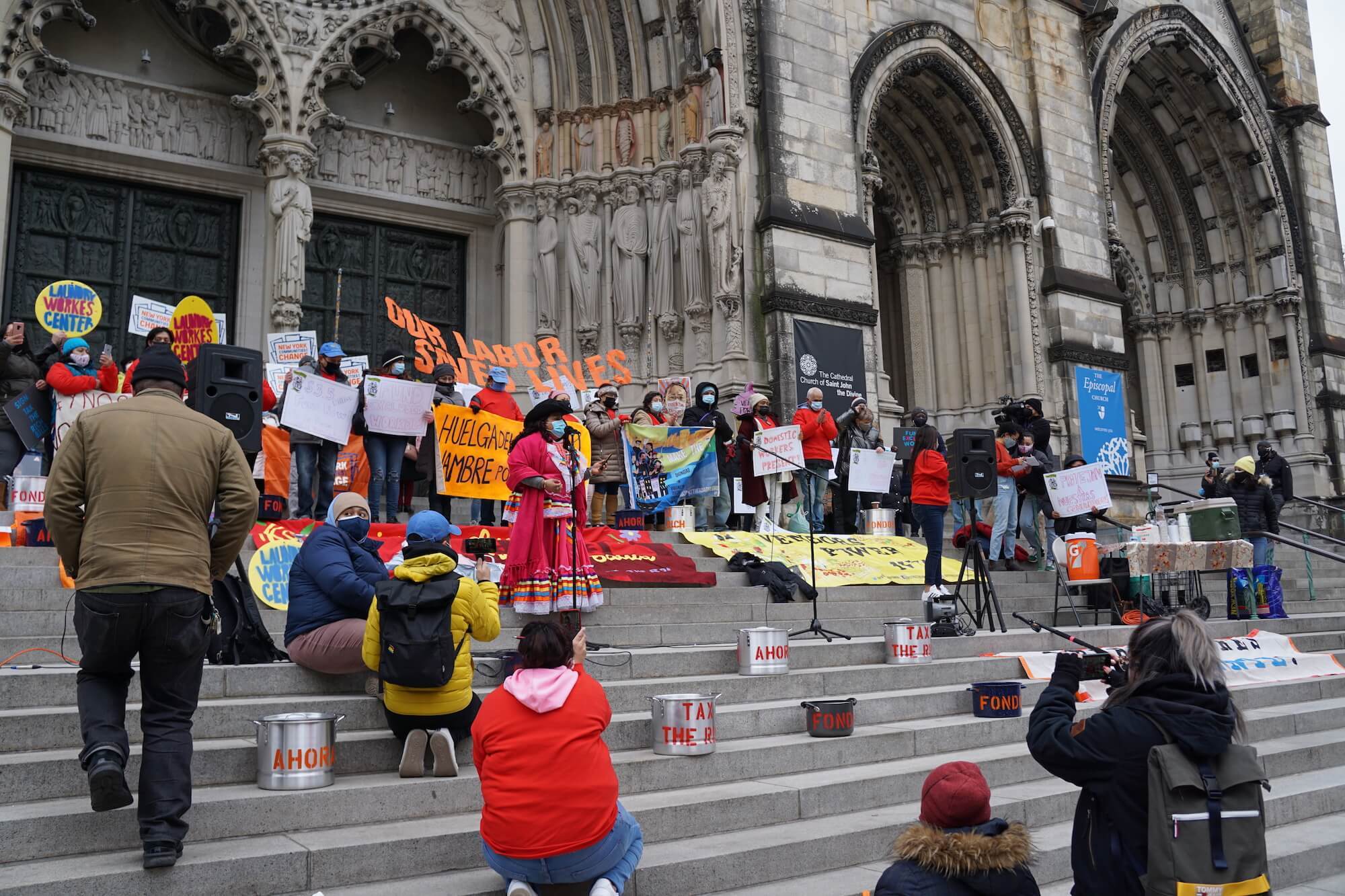
The protest, which organizers named the “Fast for the Forgotten,” kicked off in Manhattan’s Morningside Heights neighborhood outside of the Cathedral Church of St. John the Divine before heading downtown. Photo: Jessica Fu
Currently, members of the New York State Senate and Assembly have put forward a proposal that would finance a newly established excluded worker fund to the tune of $2.1 billion. It would be “exclusively for the purpose of providing emergency wage replacement to workers that do not qualify for unemployment insurance or other worker wage assistance programs.” As written, the fund would give eligible workers up to $3,300 per month. People who were formerly incarcerated, who are ineligible for unemployment benefits, would also be covered, as would families whose primary breadwinner died during the Covid-19 crisis.
The proposal appears likely to pass due to Democratic supermajorities in both houses. But immigrant advocacy groups like Make the Road New York, an organizer of the hunger strike, say that it doesn’t go far enough. “The people that are here today, they should be home taking care of themselves,” said Brayan Pagoada, an organizer with Churches United for Fair Housing, a nonprofit participating in the strike. “Legislators need to do the work.”
Immigrant advocates have long criticized prior Covid-19 relief bills for excluding undocumented workers. They argue that these gaps have a significant impact on urban areas where many residents lack legal work authorization. A little over half a million undocumented immigrants live in New York City, according to a municipal report published last February.
“Here are domestic workers, street vendors, construction workers, delivery workers that travel in the snow to deliver food to your door.”
Advocates also point out that the pandemic has disproportionately impacted these immigrants, many of whom work what have been deemed “essential” jobs—such farm workers, food processing workers, food delivery couriers, and more.
“From the beginning of the pandemic, I’ve been severely affected because there wasn’t the same kind of business as there was before,” said Maria, a street vendor who declined to provide her last name. Maria sells lunches near construction sites in Manhattan. “Even now, as things start to get back to normal, it’s not what it used to be.”
Mariah lives with her husband and a daughter, and has another daughter in Guatemala, where she is from. For her, cash assistance would supplement lost income, cover bills, and send support to her daughter abroad.
Also read: Food Workers Can Now Get the COVID Vaccine. Here’s How
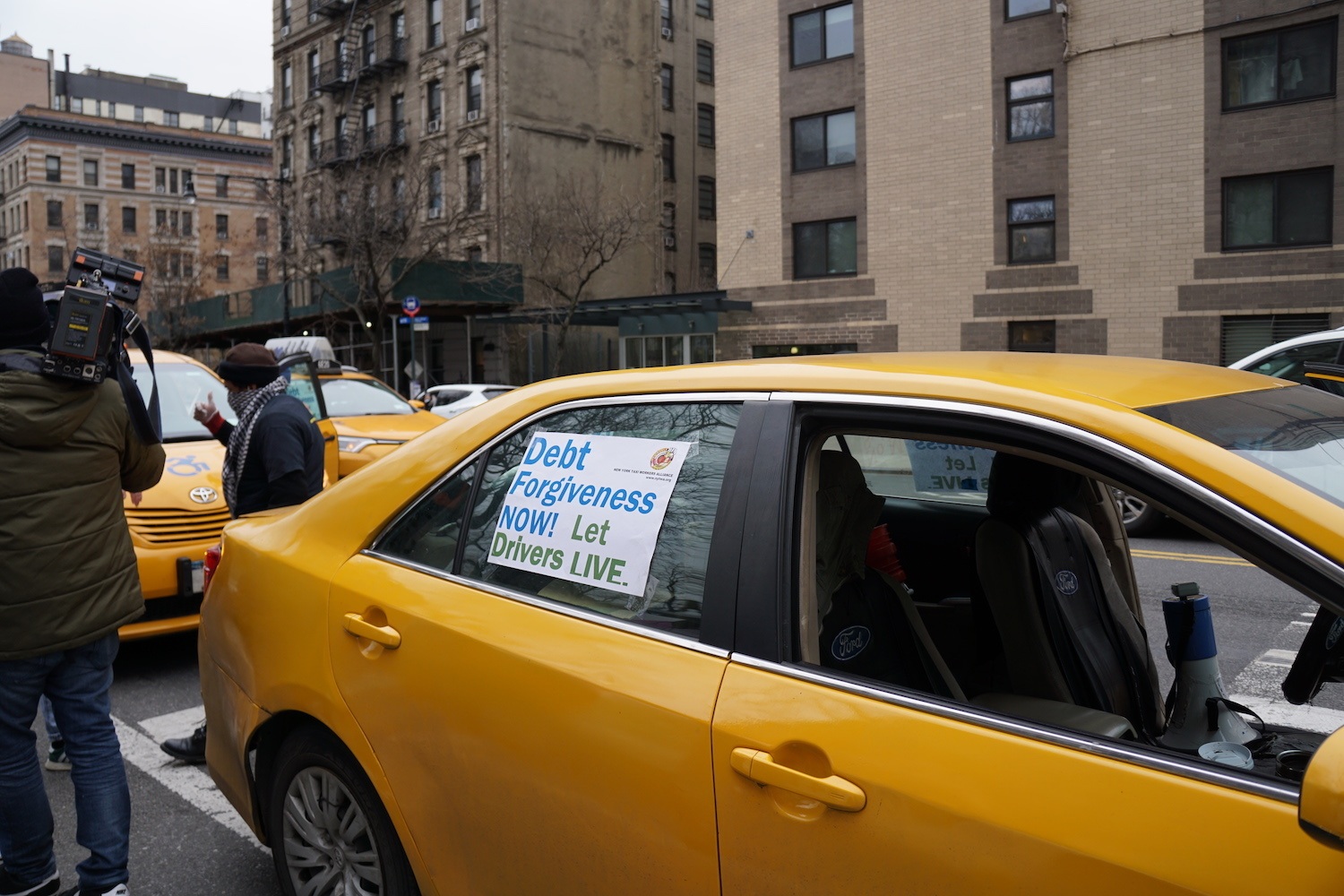
A line of taxi cabs parked down Amsterdam Avenue in Manhattan in support of strikers on March 16, 2021. Photo: Jessica Fu
“During this time, I feel bad because I haven’t been able to provide the support that I want to my daughter in Guatemala.”
If the proposed bill passes, it wouldn’t be the first time that a state stepped in to fill in the gaps in federal Covid-19 relief. Last month, California lawmakers passed a bill that would provide $600 stimulus checks to undocumented workers. Advocates say that this kind of support would go far in providing a safety net to New York families, including many with U.S. children.
“I’m here starting a hunger strike, because I’ve been excluded from all government relief that has been given to workers,” said Ana Ramirez, who worked in the restaurant industry before the pandemic was declared last March. Because she is undocumented, Ramirez has not been able to access unemployment benefits, not paying rent and relying on food pantries to get by during the pandemic. Cash assistance would be a huge weight off her family’s shoulders, she said. “We want to be treated like any other worker in this country.”
Since last November, Democrats in New York’s Senate and Assembly have had supermajorities, meaning that they can override any potential veto by Governor Andrew Cuomo. (Cuomo did not include an excluded workers fund in his own budget plan.) State legislators currently have two weeks to go before the state budget deadline. Protesters will be fasting at the Church of the Ascension in Manhattan’s Greenwich Village neighborhood through Friday.
Also read: Essential Subway Workers Allege Underpayment and Dangerous Conditions
